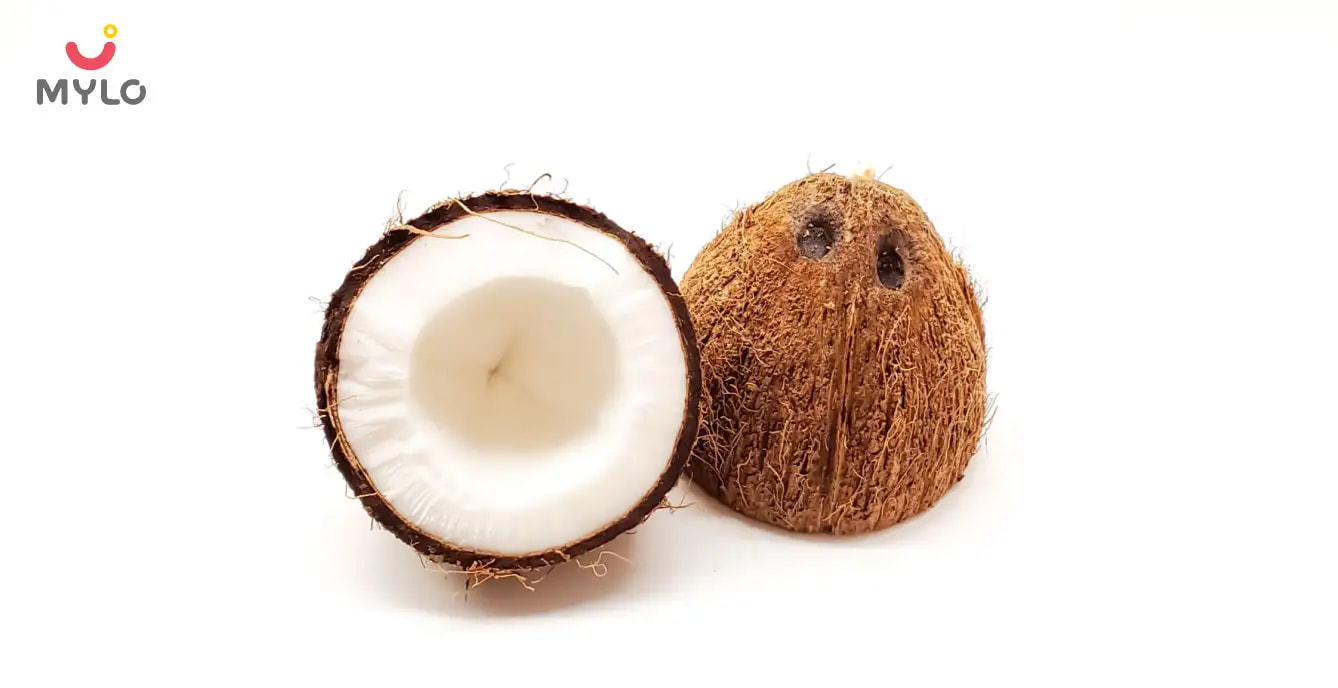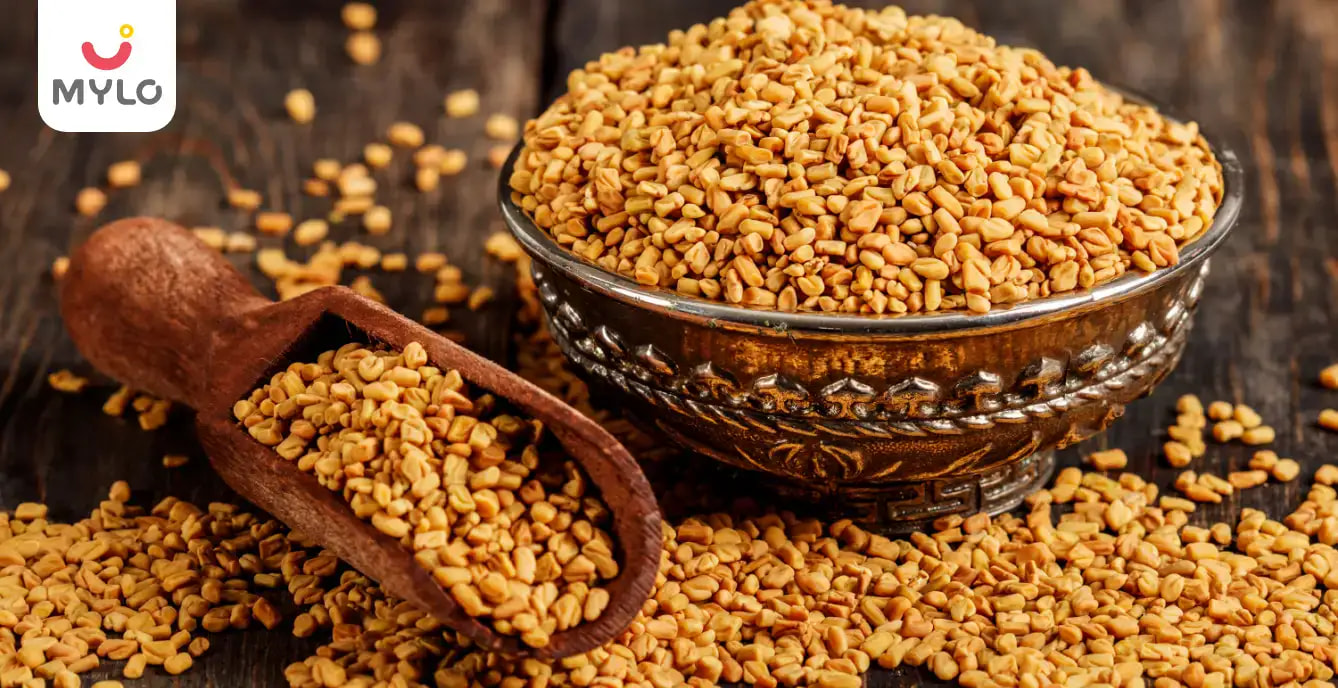Home

Diet & Nutrition

Coconut in Pregnancy: The Ultimate Guide to Benefits, Myths and Precautions
In this Article

Diet & Nutrition
Coconut in Pregnancy: The Ultimate Guide to Benefits, Myths and Precautions
Updated on 3 November 2023
Pregnancy is a beautiful journey filled with joy, anticipation, and the desire to provide the best for the growing baby. As an expectant mother, you may be wondering about the foods that can nourish both you and your little one. One such wonder-food that has gained immense popularity is coconut in pregnancy.
From its refreshing water to its versatile flesh, coconut offers a plethora of benefits for pregnant women. In this comprehensive guide, we will explore the amazing advantages of incorporating coconut into your pregnancy diet, debunk common myths, and discuss important precautions to ensure a safe and healthy journey.
Nutritional Value
Coconuts are a great source of essential vitamins and minerals. The nutrients present in coconut include:
- Calories: 35 calories
- Protein: Less than 1 gram
- Fat: 3 grams
- Carbohydrates: 2 grams
- Fiber: 1 gram
- Sugar: 1 gram
- Folate: Small amounts
- Vitamin C: Small amounts
- Thiamin: Small amounts
- Plant-based saturated fats
- Minerals: Manganese, copper, selenium, and iron
- B-complex vitamins
Is It Safe to Consume Coconut During Pregnancy?
Many expecting mothers wonder “Is coconut good for pregnancy?” The answer is a resounding yes! Coconuts are generally considered safe for consumption during pregnancy, as long as they are consumed in moderation and in their natural form. However, it is important to consult with your healthcare provider before making any significant changes to your diet.
You may also like: Top 10 Ways in Which Coconut Water Can Help During Pregnancy
What Are the Benefits of Eating Coconut During Pregnancy?
Eating coconut during pregnancy can provide numerous benefits for both the mother and the baby. Here are five key advantages of incorporating coconut into your pregnancy diet:
1. Boosts Immunity
Coconuts are rich in lauric acid, a medium-chain fatty acid with antimicrobial and antiviral properties. Consuming tender coconut during pregnancy can help strengthen the immune system, reducing the risk of infections and illnesses.
2. Supports Brain Development
Coconut contains healthy fats that are essential for the development of the baby's brain and nervous system. These fats, particularly medium-chain triglycerides (MCTs), are easily absorbed and utilized by the body, providing a valuable source of energy.
3. Provides Energy
Pregnancy can be physically demanding, and fatigue is a common complaint. Coconut is an excellent source of natural energy due to its high content of MCTs. Incorporating tender or dry coconut in pregnancy into your diet can help combat fatigue and keep you energized throughout the day.
4. Promotes Healthy Skin
The hormonal changes that occur during pregnancy can often lead to skin issues like dryness and stretch marks. Coconut oil, derived from the fruit, is a natural moisturizer that can nourish and hydrate the skin, reducing the appearance of stretch marks and keeping the skin supple and healthy.
5. Aids in Digestion
Constipation is a common problem during pregnancy, and the high fiber content of coconut can help alleviate this issue. Consuming coconut can promote smooth digestion, prevent constipation, and ensure a healthy functioning digestive system.
Common Myths About Coconut in Pregnancy
There are several myths surrounding the consumption of coconut during pregnancy. Let's debunk some of these myths and uncover the truth:
Myth 1: Coconut water can induce labor
Truth: There is no scientific evidence to support this claim. Coconut water is a healthy and hydrating beverage that can be enjoyed during pregnancy without any concerns of inducing labor.
Myth 2: Coconut oil can cause preterm labor
Truth: Coconut oil is safe to consume during pregnancy and does not cause preterm labor. However, as with any oil or fat, it should be consumed in moderation as part of a balanced diet.
Myth 3: Coconut can lead to allergies in the baby
Truth: While allergies can develop in babies, coconut is not a common allergenic food. If there is no family history of coconut allergies, there is no reason to avoid consuming coconut while being pregnant.
Myth 4: Coconut increases the risk of gestational diabetes
Truth: Coconut, when consumed in moderation, does not increase the risk of gestational diabetes. It is a nutrient-dense fruit that can be safely included in a balanced pregnancy diet.
Myth 5: Eating coconut can cause weight gain
Truth: Like any food, excessive consumption of coconut can contribute to weight gain. However, when consumed in moderation as part of a healthy diet, coconut can be a beneficial addition without causing significant weight gain.
Raw Coconut vs. Dry Coconut: Which Is Better During Pregnancy?
Both raw coconut and dry coconut offer their own set of benefits during pregnancy. The benefits of eating raw coconut in pregnancy include the fact that raw coconut is rich in electrolytes, making it a great source of hydrating. It also contains enzymes that aid in digestion and can help alleviate morning sickness.
On the other hand, dry coconut in pregnancy is high in dietary fiber and can aid in preventing constipation. Some women may find that raw coconut water helps quench their thirst and keeps them hydrated, while others may prefer the versatility of dry coconut in cooking and baking.
The choice between raw coconut and dry coconut ultimately depends on personal preference and how they are incorporated into the diet.
Precautions When Consuming Coconut in Pregnancy
While coconut is generally safe for consumption during pregnancy, it is important to take certain precautions:
1. Moderation is key
Like any food, moderation is crucial. Consuming excessive amounts of coconut may lead to an increase in calorie intake, which can contribute to weight gain.
2. Allergies
If you have a family history of coconut allergies, it is advisable to consult with your healthcare provider before introducing coconut into your pregnancy diet.
3. Hygiene
Ensure that the coconut you consume is fresh and properly cleaned to minimize the risk of foodborne illnesses.
4. Quality and sourcing
Choose high-quality coconuts and coconut products from reputable sources to ensure their safety and nutritional value.
How to Incorporate Coconut Into Your Pregnancy Diet?
Incorporating coconut into your pregnancy diet can be both delicious and nutritious. Here are some simple and tasty ways to enjoy coconut during pregnancy:
1. Coconut water
Stay hydrated and refreshed by drinking coconut water straight from the fruit or buying it from trusted brands.
2. Coconut milk
Use coconut milk as a dairy alternative in smoothies, curries, or desserts.
3. Coconut oil
Replace your regular cooking oil with coconut oil for a healthier option. It adds a delightful flavor to dishes and can be used for baking as well.
4. Shredded coconut
Sprinkle shredded coconut over your oatmeal, yogurt, or salads for an added tropical twist.
5. Coconut flour
Experiment with coconut flour in your baking recipes for a gluten-free alternative.
Final thoughts
Coconut in pregnancy can be a valuable addition to a pregnant woman's diet, offering a range of benefits while being safe for consumption. From boosting immunity to supporting brain development, coconut provides essential nutrients that promote a healthy pregnancy. However, it is important to consume coconut in moderation and consult with your healthcare provider before making any significant changes to your diet.
References
1. Yong JW, Ge L, Ng YF, Tan SN. (2009). The chemical composition and biological properties of coconut (Cocos nucifera L.) water. Molecules.
2. Gunasekaran R, Shaker MR, Mohd-Zin SW, Abdullah A, Ahmad-Annuar A, Abdul-Aziz NM. (2017). Maternal intake of dietary virgin coconut oil modifies essential fatty acids and causes low body weight and spiky fur in mice. BMC Complement Altern Med.
Tags
Coconut in Pregnancy: Benefits & Myths in Hindi, Coconut in Pregnancy: Benefits & Myths in Tamil, Coconut in Pregnancy: Benefits & Myths in Telugu, Coconut in Pregnancy: Benefits & Myths in Bengali



Written by
Parul Sachdeva
A globetrotter and a blogger by passion, Parul loves writing content. She has done M.Phil. in Journalism and Mass Communication and worked for more than 25 clients across Globe with a 100% job success rate. She has been associated with websites pertaining to parenting, travel, food, health & fitness and has also created SEO rich content for a variety of topics.
Read MoreGet baby's diet chart, and growth tips

Related Articles
Related Questions
Influenza and boostrix injection kisiko laga hai kya 8 month pregnancy me and q lagta hai ye plz reply me

Hai.... My last period was in feb 24. I tested in 40 th day morning 3:30 .. That is faint line .. I conculed mylo thz app also.... And I asked tha dr wait for 3 to 5 days ... Im also waiting ... Then I test today 4:15 test is sooooo faint ... And I feel in ma body no pregnancy symptoms. What can I do .

Baby kicks KB Marta hai Plz tell mi

PCOD kya hota hai

How to detect pcos

Related Topics
RECENTLY PUBLISHED ARTICLES
our most recent articles

Diet & Nutrition
গর্ভাবস্থায় আলুবোখরা: উপকারিতা ও ঝুঁকি | Prunes During Pregnancy: Benefits & Risks in Bengali

Diet & Nutrition
গর্ভাবস্থায় হিং | ঝুঁকি, সুবিধা এবং অন্যান্য চিকিৎসা | Hing During Pregnancy | Risks, Benefits & Other Treatments in Bengali

Women Specific Issues
স্তনের উপর সাদা দাগ: লক্ষণ, কারণ এবং চিকিৎসা | White Spots on Nipple: Causes, Symptoms, and Treatments in Bengali

Diet & Nutrition
গর্ভাবস্থায় পোহা: উপকারিতা, ধরণ এবং রেসিপি | Poha During Pregnancy: Benefits, Types & Recipes in Bengali

Diet & Nutrition
গর্ভাবস্থায় মাছ: উপকারিতা এবং ঝুঁকি | Fish In Pregnancy: Benefits and Risks in Bengali

Diet & Nutrition
গর্ভাবস্থায় রেড ওয়াইন: পার্শ্ব প্রতিক্রিয়া এবং নির্দেশিকা | Red Wine During Pregnancy: Side Effects & Guidelines in Bengali
- ইনার থাই চ্যাফিং: কারণ, উপসর্গ এবং চিকিৎসা | Inner Thigh Chafing: Causes, Symptoms & Treatment in Bengali
- গর্ভাবস্থায় ব্রাউন রাইস: উপকারিতা ও সতর্কতা | Brown Rice During Pregnancy: Benefits & Precautions in Bengali
- Velamentous Cord Insertion - Precautions, Results & Safety
- Unlock the Secret to Flawless Skin: 7 Must-Have Qualities in a Face Serum
- Unlock the Secret to Radiant Skin: How Vitamin C Serum Can Transform Your Complexion
- Gender No Bar: 10 Reasons Why Everyone Needs a Body Lotion
- Unlock the Secret to Radiant Skin How to Choose the Perfect Body Lotion for Your Skin Type
- Top 10 Reasons to Apply a Body Lotion After Every Bath
- Communication in Toddlers: Milestones & Activities
- How to Improve Vocabulary for Toddlers?
- A Comprehensive Guide to Understanding Placenta Accreta
- Vulvovaginitis in Toddlers Causes, Symptoms and Treatment
- A Comprehensive Guide to Understanding Cerebral Palsy in Children
- Bitter Taste in Mouth During Pregnancy: Understanding the Causes and Remedies


AWARDS AND RECOGNITION

Mylo wins Forbes D2C Disruptor award

Mylo wins The Economic Times Promising Brands 2022
AS SEEN IN
















- Mylo Care: Effective and science-backed personal care and wellness solutions for a joyful you.
- Mylo Baby: Science-backed, gentle and effective personal care & hygiene range for your little one.
- Mylo Community: Trusted and empathetic community of 10mn+ parents and experts.
Product Categories
baby carrier | baby soap | baby wipes | stretch marks cream | baby cream | baby shampoo | baby massage oil | baby hair oil | stretch marks oil | baby body wash | baby powder | baby lotion | diaper rash cream | newborn diapers | teether | baby kajal | baby diapers | cloth diapers |








